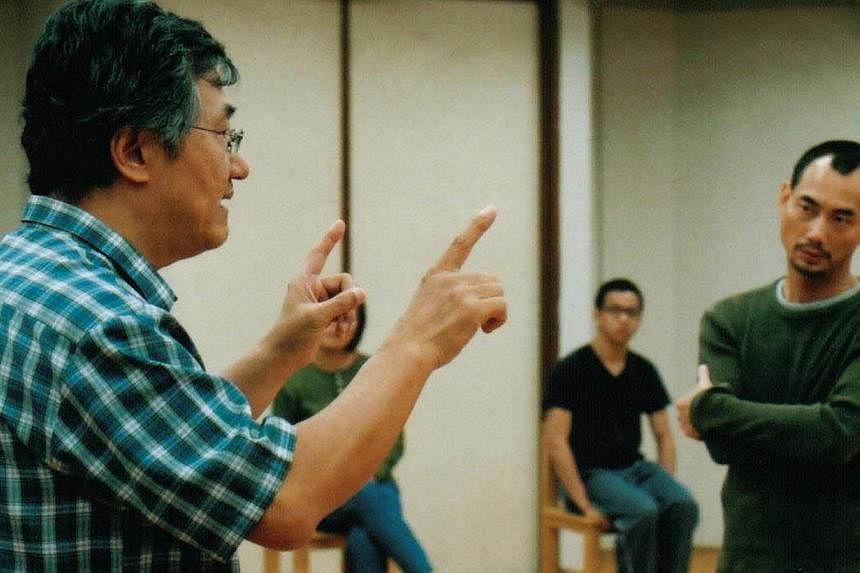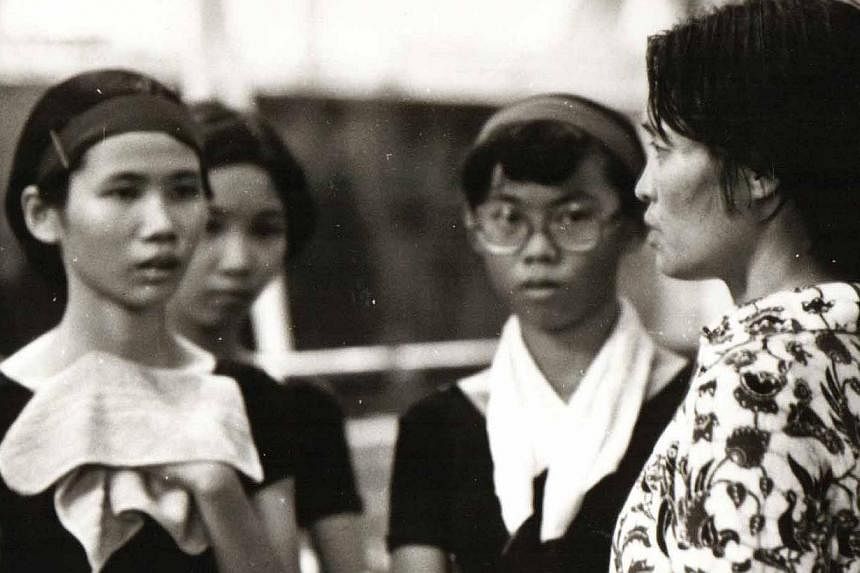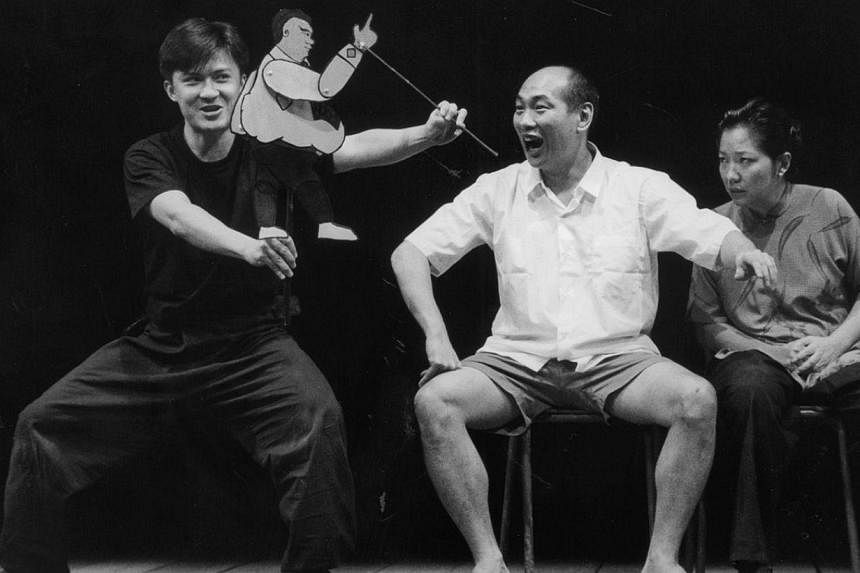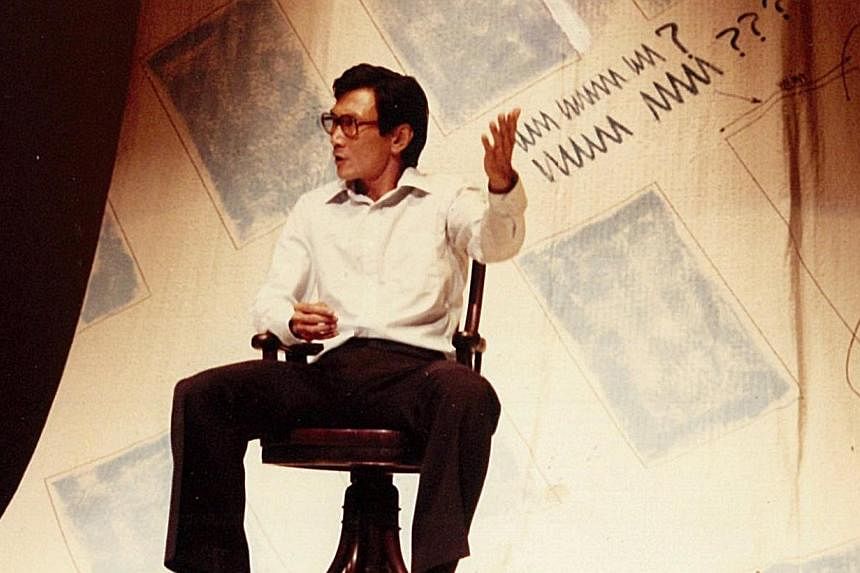The world of wuxia (Chinese martial arts) is a fantastical one, inhabited by prodigious villains and wandering heroes who forge their own paths though life, defeating oppressors and abiding by their own creed.
"Wuxia is the Chinese version of superheroes, it is our version of The Avengers," says artistic director of The Theatre Practice Kuo Jian Hong.
The company's first wuxia epic, Legends Of The Southern Arch, opens at the Drama Centre Theatre at the end of the month. The show, which also marks the company's 50th anniversary, brings together different generations of theatre practitioners in an imaginary pugilistic world, complete with wire-work acrobatics and flowing robes.
The heroes of wuxia stories are often fiercely independent, tenacious and resourceful. The same could be said of The Theatre Practice, which has its roots in the Singapore Performing Arts School that was set up in 1965, making it the oldest theatre company here.
Founded by the late theatre giant Kuo Pao Kun and his wife, dancer-choreographer Goh Lay Kuan, the company has championed Chinese and English theatre through the sometimes turbulent landscape of the last 50 years.
It was one of the first theatre companies to broach the nebulous idea of a Singaporean identity in theatre. Several of Kuo's works, such as the allegorical The Coffin Is Too Big For The Hole (1985) and the multilingual Mama Looking For Her Cat (1988), remain cornerstones of local theatre today.
In 2002, after Kuo died from liver and kidney cancer, his elder daughter Jian Hong, now 47, took over the reins.
Today, taking stock of how far the company has come, the younger Kuo is nonplussed about the upcoming 5-0 milestone.
"Frankly, 50 is not that different from 49 or 51. It's just that people like to have round numbers to talk about. I feel that at 50 years, we shouldn't be worried about proving anything," she muses, while speaking to Life!.
Despite her nonchalance, it is clear that more than a decade at the helm of The Theatre Practice has imbued her with a quiet assurance. When she took up the role of artistic director, she was extremely nervous.
"Nobody teaches you how to be an artistic director, you don't learn that in school, there is no manual," says Kuo, who holds a Master's in Stage Design from the University of Iowa and a Master's in Directing from University of Hawaii, and has been a theatre director, lighting designer and film-maker over a career that spans nearly 30 years. She is married to American film-maker and writer Christopher Hatton and they have a 10-year-old daughter.
Helming the successful Lao Jiu: The Musical (2012) - an effective reboot of one of her father's iconic plays - she has grown along with the theatre group. "I feel that as an organisation, internally, there is a sense of clarity and confidence in what we want to do, how to do it and why we're doing it."
As for co-founder Madam Goh, 76, she says she never dreamt the group would one day be celebrating five decades in the business. The dance pioneer, who remains the artistic adviser of the company, recalls not daring to look too far ahead, given the lack of funds and political restrictions during the company's early years.
Back in 1976, both she and her late husband were arrested for alleged communist activities under the Internal Security Act and he was detained for more than four years. Following his release, during the 1980s and 1990s, The Theatre Practice faced new challenges, including dwindling audiences for Chinese theatre.
Says Madam Goh: "In my time, it was very difficult. I gave myself three years and when we reached the third year, I said, we can still breathe and we can still move, let's go for another three years.
"Then, it was just a three-year plan and then another three-year plan after that."
In recent years, the bilingual company has won a following for mainstream productions such as last year's big-budget xinyao musical If There're Seasons, while maintaining street cred through periodic experimental works. In short, it is stable enough to peer further into the future. The Theatre Practice is now on the second year of a 10-year plan, which focuses on the development of works with both broader as well as niche appeal, as well as the restaging of old repertoire and steering the annual M1 Chinese Theatre Festival, which it started in 2011.
Kuo thinks it is critical to cover both ends of the mainstream-experimental spectrum, which she terms the "centre" and the "edge" respectively.
She explains: "If I were to put it simply, I think for the centre, you have to consider the audience more, and for the edge, you have to consider the artist more."
The best person to speak about the group's artistic edge is the director of the two-year-old The Practice Lab, Liu Xiaoyi, 36, who has worked with the company as a director, playwright and actor.
He says: "The Lab is creation-centric, so we try to create theatre that is both poetic and critical. We're not necessarily telling a story as we believe that theatre can be more than a story or larger than a story."
The Lab - which is as much about training as it is about producing new work - comprises five sections, for actors, directors, playwrights, audiencerelated activities and reviewers. A dozen actors have made the cut for this year's Lab, while three of the 12 have also been chosen to receive training as directors.
While the company's other thrust comprises more conventional forms of theatre such as musicals, it is also on Kuo's agenda to push the limits of the audience. She says: "We also have to play other kinds of things, so we are stretching our audience. We have to expose them and expand their tastes."
At the same time, the company is also aware of its rich history. In the pipeline are revivals of several past productions, such as the original Lao Jiu (1990) and its well-received Chinese rock musical Liao Zhai Rocks! (2010), as well as one of her father's earliest Chinese works, the left-leaning The Struggle (1969).
Kuo says: "Such theatre productions become part of our heritage and, if the pieces are strong enough, they need to be done for the next generation of the audience."
Restaging an old production does not simply mean dusting it off and re-creating the past, however. It also means sharpening and tightening the show, a process the director likens to drying out salted fish.
"To keep the salted fish, you need to squeeze out all the water," she asserts. "It has to be lean, mean and precise, then you can keep the salted fish for a long time. If there is any water inside, it will rot."
The company hopes to aim for longer runs for its productions, beyond the average two weeks. It also plans to find a new base as its long-time home, Stamford Arts Centre in Waterloo Street, will undergo major renovation soon.
Kuo is also mindful of the need to groom the next generation of theatre practitioners, including those who can help lead the company. When asked for a list of her possible successors, she rattles off names such as Liu, The Theatre Practice resident artist Hung Chit Wah and its director of education and outreach Melissa Leung.
However, Kuo says: "I don't think of leadership as one person. I'm not doing this as one person, we're doing this as a team and all these people are the next generation. Theatre is such a collaborative process, and it's only through a collective that you can bring it together."
Collaboration is very evident in the wuxia adventure Legends Of The Southern Arch. The production "was an opportunity to assemble some of our best actors. If you look at it, there are probably four generations of actors here. Unfortunately, I straddle all of them. I started young", Kuo says with a laugh.
Written by Liu and directed by Kuo, the production will feature familiar names such as television personality Marcus Chin and theatre veterans such as Johnny Ng, Goh Guat Kian and Nelson Chia.
It traces the legend of a secret manual which is hidden under the Southern Arch by a cult and revealed every 60 years. Since the fall of the cult, there has been peace, but as the 60-year cycle nears the end, unrest is bubbling over.
Kuo's risk-taking and never-say-die attitude is why the company is tackling wuxia, a genre which is not commonly seen on stage, but in novels, comics and on television. "For our 50th anniversary, I didn't want to do a retrospective. If this is to be an occasion, then let's do something different and take some risks," she declares.
While there will be fantastic martial arts stunts and dazzling fighting sequences, Kuo says that at the heart of the piece is a relatable human story. Any superhero movie worth its salt has that as its core, she adds.
"Let's take Iron Man for example," she says. "What makes Iron Man better than a lot of other heroes is the human story. So whether they take out guns, jian (swords) or invisible force fields, it still goes back to that."
It is this desire to tell the human story that has fuelled The Theatre Practice for the last 50 years and will hopefully carry it through another 50 more.
"At the end of the day, for me, it is all about people," says Kuo.
"If you have a bunch of good people, you can make a lousy thing good and meaningful. If you have a meaningful thing and a lousy group of people, it can become totally worthless," she adds.
"When I'm working, I'm always having a dialogue with the people I work with, with the audience. And that's what makes this exciting for me and meaningful to me."






